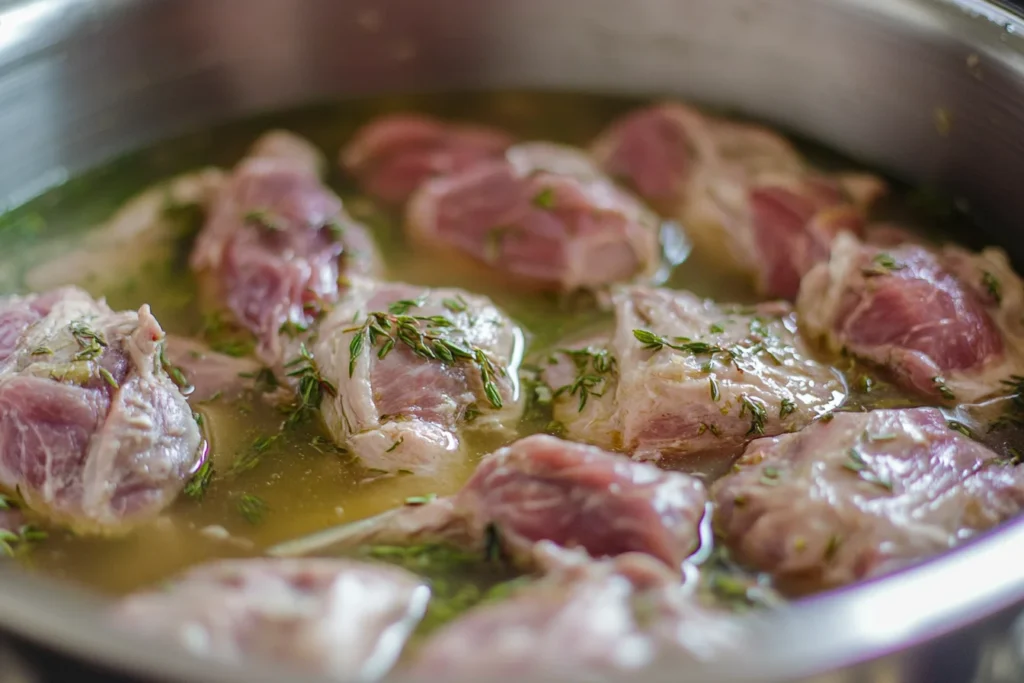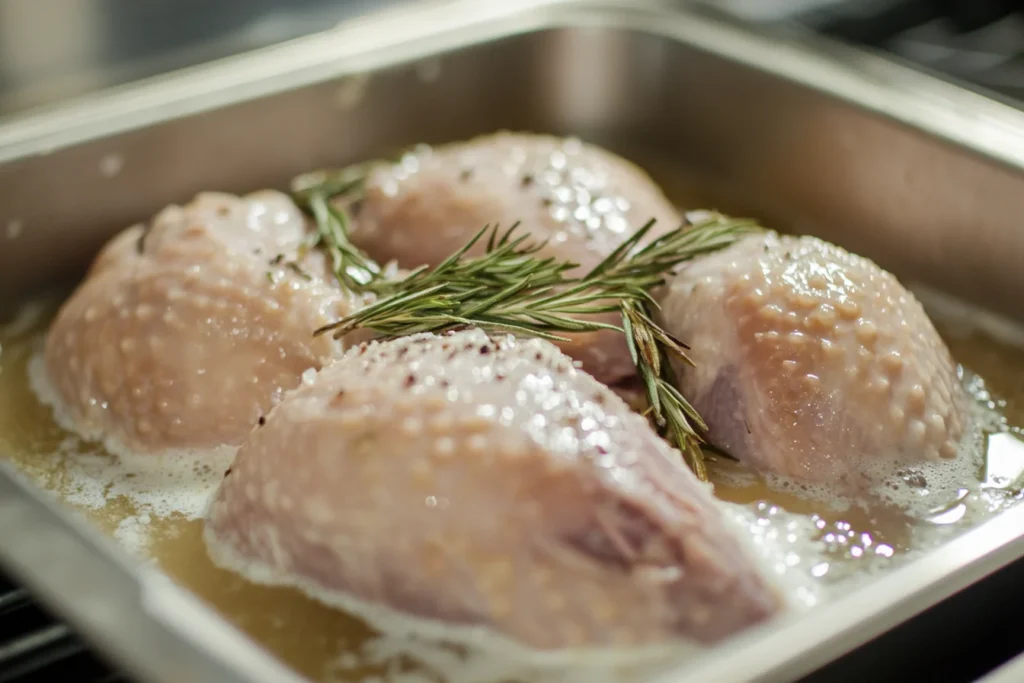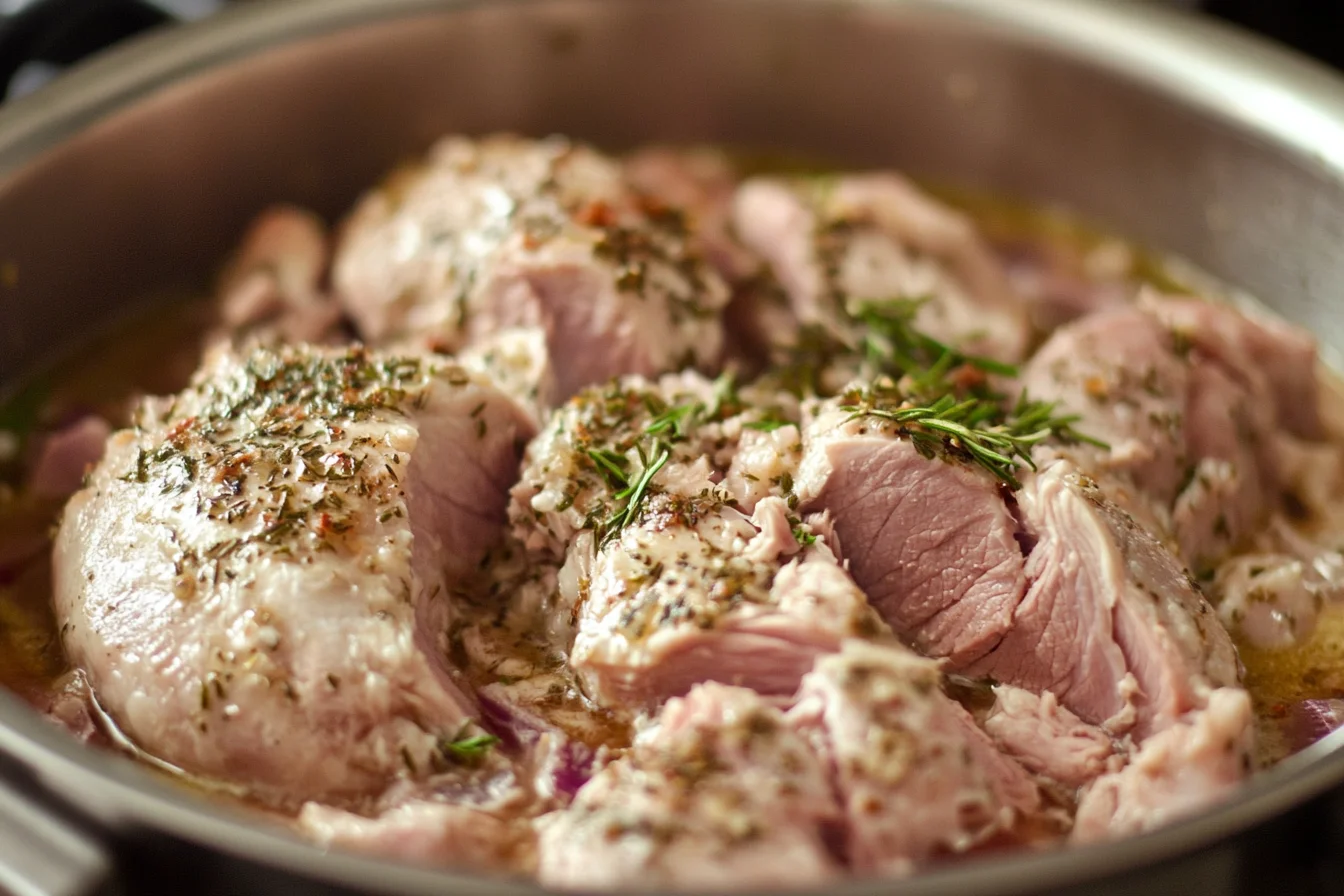Wild turkey can be a challenging bird to cook, particularly if it’s your first time preparing it. Unlike its domestic counterparts, wild turkey is leaner, which means it can quickly become tough and dry if not handled properly. A common question many people ask is: What do you soak wild turkey in before cooking? The answer to this question can vary, depending on the desired outcome, but soaking wild turkey can significantly improve its texture and flavor, making it a delicious centerpiece for any meal.
Table of Contents
The Importance of Soaking Wild Turkey
Soaking wild turkey before cooking can greatly influence the tenderness and overall taste of the meat. Since wild turkeys are active birds, their muscles are firmer, leading to a potentially tougher cut of meat if not treated correctly. Brining or marinating the wild turkey helps to break down the muscle fibers, retaining moisture, and ensuring the final dish is succulent.
Why Brine Your Wild Turkey?

Brining is one of the most popular methods for soaking wild turkey, primarily because it allows the bird to retain moisture throughout the cooking process. By soaking the turkey in a saltwater solution, you are ensuring that the meat stays juicy and flavorful even if it spends a bit too long in the oven or smoker.
Ingredients for a Simple Brine Solution
To make a basic brine for wild turkey, you’ll need the following:
- Water: Enough to fully submerge the turkey.
- Salt: Kosher salt or sea salt, as they dissolve more evenly.
- Sugar: Adds a touch of sweetness to counterbalance the saltiness.
- Aromatics: Fresh herbs like thyme or rosemary, peppercorns, garlic, and even a bit of citrus zest.
The standard ratio for a brine is about one cup of salt to one gallon of water. You can also add about half a cup of sugar for every gallon of water if you prefer a slightly sweet flavor profile.
How Long Should You Brine Wild Turkey?
The amount of time you soak the turkey is crucial. Ideally, a wild turkey should be brined for 12-24 hours. Anything shorter may not penetrate deeply enough, while brining for too long can make the meat overly salty and soft.
When brining, keep the turkey refrigerated to maintain food safety. Brining also works best if the turkey is completely thawed to allow the solution to reach all parts of the bird.
Types of Brines
There are several types of brines you can use to soak wild turkey, each offering unique flavors and benefits. Here are some popular options:
Salt and Sugar Brine
This is the most basic type of brine, consisting of just salt, sugar, and water. It’s effective for maintaining moisture and adding a subtle sweetness to the meat. You can add aromatics such as garlic, bay leaves, and peppercorns for additional depth of flavor.
Herb-Infused Brine
An herb-infused brine can elevate the flavor of the wild turkey by adding layers of freshness. Ingredients like thyme, rosemary, sage, and bay leaves are perfect for this type of brine. You can also add sliced onions and crushed garlic cloves for an aromatic touch.
Spiced Brine
For a unique flavor profile, consider adding spices like paprika, mustard seeds, or coriander to your brine. This type of brine adds a bit of warmth and complexity to the meat, making it a great option for those who want to experiment with flavors.
Popular Alternatives to Brining

If brining isn’t ideal for you, there are several other methods for soaking wild turkey. Let’s look at a few of them.
Buttermilk Soak
One effective alternative to a traditional brine is a buttermilk soak. Buttermilk is slightly acidic, which helps to tenderize the wild turkey. Additionally, the richness of the buttermilk lends a subtle creaminess to the final dish. Here are some common benefits:
- Tenderizing Effect: The acid in buttermilk breaks down proteins, making the meat softer.
- Flavor Addition: Adds a subtle tang without overpowering the turkey’s natural flavor.
A standard recommendation is to soak the turkey in buttermilk for 8-12 hours before cooking. You can also add some spices directly to the buttermilk, like garlic powder, onion powder, and paprika, to impart additional flavor.
How to Prepare a Buttermilk Soak
To prepare a buttermilk soak, follow these steps:
- Combine Ingredients: Mix enough buttermilk to fully submerge the turkey, along with your choice of spices.
- Submerge the Turkey: Place the turkey in a large container and pour the buttermilk mixture over it.
- Refrigerate: Cover the container and refrigerate for 8-12 hours.
- Rinse and Pat Dry: After soaking, rinse the turkey lightly and pat it dry before cooking.
Apple Cider Vinegar Mixture
Using an apple cider vinegar-based soak is another great way to tenderize the meat while adding a bit of natural sweetness and acidity. This method can be useful if you want the bird to have a more distinctive taste. Here’s how to prepare the mixture:
- Water: Use equal parts water and apple cider vinegar.
- Spices: Add crushed garlic cloves, bay leaves, and a bit of brown sugar.
Soak the turkey in this solution for about 4-6 hours. The vinegar will work its way into the meat, breaking down proteins and adding flavor. However, it’s important not to overdo it—soaking for too long can result in a mushy texture due to the acidity.
Beer and Herb Soak
For a unique twist, you can soak your wild turkey in a mixture of beer and fresh herbs. The carbonation in beer helps to tenderize the meat, while the malt and hops add a deep, earthy flavor. Here’s a simple recipe for a beer soak:
- Beer: Use enough beer to cover the turkey completely.
- Herbs: Add rosemary, thyme, and bay leaves.
- Garlic and Onion: Include chopped garlic and onion for added flavor.
Soak the turkey in this mixture for 6-8 hours, then cook as desired. This soak works particularly well for roasting or smoking the turkey.
Should You Use a Marinade Instead?
Marinades are also popular, though they serve a slightly different function compared to brines. Marinades tend to add flavor to the outer layers of the meat, while brines help to enhance moisture throughout. If you choose to marinate your wild turkey, keep these considerations in mind:
- Oil Base: Start with an oil like olive oil or vegetable oil.
- Acid: Use an acid like lemon juice or vinegar to help tenderize.
- Herbs and Spices: Fresh herbs, garlic, mustard, or Worcestershire sauce are great additions to complement the flavors of wild turkey.
Recommended Marinade Recipes
A popular marinade for wild turkey includes the following ingredients:
- 1/4 cup olive oil
- 2 tablespoons lemon juice
- 1 teaspoon Dijon mustard
- 3 garlic cloves, minced
- 1 teaspoon fresh thyme
Marinate the turkey for up to 6 hours, ensuring the meat gets enough time to absorb the flavors without becoming too mushy.
Citrus Herb Marinade
For a fresh and zesty flavor, consider using a citrus herb marinade. This marinade is ideal for grilling or roasting and adds a bright, tangy taste to the turkey.
- Ingredients:
- 1/4 cup orange juice
- 1/4 cup lemon juice
- 2 tablespoons olive oil
- 2 tablespoons honey
- 1 teaspoon grated ginger
- 2 garlic cloves, minced
- 1 tablespoon chopped fresh basil
Mix all the ingredients and marinate the turkey for 4-6 hours before cooking. The citrus juices help to tenderize the meat while adding a refreshing flavor.
Spicy Garlic Marinade
If you prefer a bit of heat, a spicy garlic marinade is a great option. This marinade adds a kick to the wild turkey without overwhelming its natural flavor.
- Ingredients:
- 1/4 cup vegetable oil
- 2 tablespoons apple cider vinegar
- 1 tablespoon hot sauce
- 4 garlic cloves, minced
- 1 teaspoon smoked paprika
- 1/2 teaspoon cayenne pepper
Marinate the turkey for 4-6 hours, then cook as desired. This marinade is perfect for those who enjoy a spicy twist to their meals.
What Do You Soak Wild Turkey in Before Cooking? Cooking Methods for Wild Turkey After Soaking
Once you’ve soaked your wild turkey, the cooking method you choose will play a crucial role in the final texture and flavor of the meat. Here are some popular cooking methods:
Smoking
Smoking wild turkey is a popular method that imparts a rich, smoky flavor to the meat. After soaking, pat the turkey dry and apply a dry rub before placing it in the smoker. Smoke at a low temperature (around 225°F) until the internal temperature reaches 165°F. Smoking can take several hours, depending on the size of the bird, but the result is well worth the wait.
Roasting
Roasting is a classic way to prepare wild turkey. After soaking, season the turkey with herbs, salt, and pepper. Roast in the oven at 350°F until the internal temperature reaches 165°F. Basting the turkey periodically with its juices or melted butter helps to keep the meat moist.
Grilling
Grilling is another excellent way to cook wild turkey, especially if you’ve used a flavorful marinade. Preheat the grill to medium heat and cook the turkey, turning occasionally, until the internal temperature reaches 165°F. Grilling adds a nice char to the outside of the meat while keeping the inside juicy.
Frying
Frying is a less common but delicious way to cook wild turkey. After soaking, coat the turkey in seasoned flour or breadcrumbs and fry in hot oil until golden brown and cooked through. Frying adds a crispy texture to the outside while keeping the meat tender and juicy on the inside.
Tips for Cooking Wild Turkey
- Use a Meat Thermometer: Always use a meat thermometer to ensure the turkey reaches an internal temperature of 165°F. This ensures the meat is cooked through and safe to eat.
- Let It Rest: After cooking, let the turkey rest for at least 15-20 minutes before carving. This allows the juices to redistribute, keeping the meat moist.
- Avoid Overcooking: Wild turkey is lean, so it can easily become dry if overcooked. Monitor the cooking time closely to avoid this.
Frequently Asked Questions
What is the best way to prepare a wild turkey?
The best way to prepare a wild turkey depends on the flavor profile you’re aiming for and the cooking method you plan to use. Brining is often recommended as the best approach because it keeps the bird moist throughout the cooking process. However, marinating or using buttermilk are also great alternatives, depending on your flavor preferences. Learn more
Are wild turkeys good to eat?
Yes, wild turkeys are good to eat. They have a more distinct, gamey flavor compared to domesticated turkeys, but this can be reduced through soaking methods such as brining or buttermilk soaks. With proper preparation, wild turkey can be a flavorful and healthy choice for a meal. Learn more
How do you make wild turkey not taste gamey?
To reduce the gamey taste of wild turkey, soaking it in a brine or buttermilk solution is highly effective. These methods help break down the compounds responsible for the strong flavor. Additionally, adding aromatic herbs and spices can further help mask any unwanted gamey notes. Learn more
What can I add to a brine to enhance the flavor of wild turkey?
To enhance the flavor of a brine for wild turkey, consider adding ingredients like fresh herbs (thyme, rosemary, sage), garlic, citrus zest, and spices like black peppercorns, coriander seeds, or mustard seeds. These additions can impart a more complex flavor to the meat.
Can I freeze wild turkey after soaking it?
Yes, you can freeze wild turkey after soaking it. If you’re not planning to cook the turkey right away, make sure to pat it dry after soaking, then wrap it tightly in plastic wrap or place it in a freezer bag. Frozen soaked turkey can be stored for up to 3 months. When ready to cook, thaw it in the refrigerator before proceeding with your cooking method.
Suggested Articles Links:


5 thoughts on “What Do You Soak Wild Turkey in Before Cooking?”